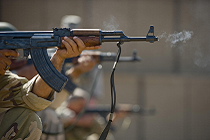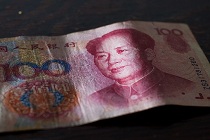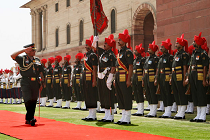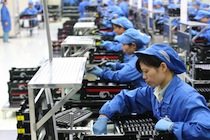Finding common ground to counter terror
India and China have divergent approaches to terrorism emanating from Pakistan. How can New Delhi prod Beijing to act on its concerns about the terrorist infrastructure in Pakistan?
 Courtesy: DVDSHUB/Flickr
Courtesy: DVDSHUB/Flickr
India and China have divergent approaches to terrorism emanating from Pakistan. How can New Delhi prod Beijing to act on its concerns about the terrorist infrastructure in Pakistan?
 Courtesy: Peter Fuchs/Flickr
Courtesy: Peter Fuchs/Flickr
The similarities between China’s ascent in the global arena and India’s rise in 2003 are striking. Manjeet Kripalani blogs about why despite their remarkable rise, it is in Beijing’s interest to take notes from the stagnation that followed India’s growth.
 Courtesy: Pete Souza/The White House
Courtesy: Pete Souza/The White House
The announcement of the Pacific pivot by the U.S. in 2001 has led to several nations making bold political moves. However, the U.S. isn’t yet ready to be a regional protector against China. What does Washington have to do to prepare itself for the Pivot?
 Courtesy: Shwkyn231/Flickr
Courtesy: Shwkyn231/Flickr
The year 2012 has been a busy one for foreign policy: from escalating disputes in the South China Sea to alternate financial instruments from the emerging world. India’s foreign policy too has its shown strengths and weaknesses. We present our top foreign policy Hotspots, Sweet spots and Blind spots for 2012.
The Chinese have learned from Russia’s past mistakes at reforming state-owned enterprises (SOE), and some well-connected politicians have reaped the economic benefits that followed. Will the new administration in Beijing reform China’s SOEs or maintain the large role of government in industry?
This October, China’s 18th Party Congress will usher in a new leadership in the Chinese Communist Party (CCP) and the People's Liberation Army, amidst increased turmoil in its neighbourhood. What consequences will this have on Indo-China relations, and on the policies of the Party?
 Courtesy: rahims/Flickr
Courtesy: rahims/Flickr
China is quick in providing loans to execute domestic and international business plans, and returns are often forgone in the quest to own market share. Faced with an economic slowdown, will Beijing be able to sustain such unconventional economic policies? Or will its banking sector prove to be its Achilles' heel?
 Courtesy: Ministry of Defence, India
Courtesy: Ministry of Defence, India
Though India may seem to be mirroring or competing with China’s military build-up, it doesn't seem to be doing so in consonance with a long-term plan. New Delhi would be better served by avoiding an arms race; staying away from the U.S.-China rivalry and fostering stronger relations with its immediate neighbours.
As India’s growth slows, it becomes increasingly important to enact reforms so it can return to its intended growth rate of 9%. Gateway House’s Hari Seshasayee interviews Anoop Singh, Director of Asia and Pacific at the IMF, to discuss the impact of the Euro zone crisis on India and the way forward for Asia.
 Courtesy: Robert Scoble/Flickr
Courtesy: Robert Scoble/Flickr
After decades of impressive growth, China and India are slowing down; but the two situations couldn't be more different. The authors explain why the economic situation of these two emerging countries cannot be compared and why it's time for India to reform or get left behind.